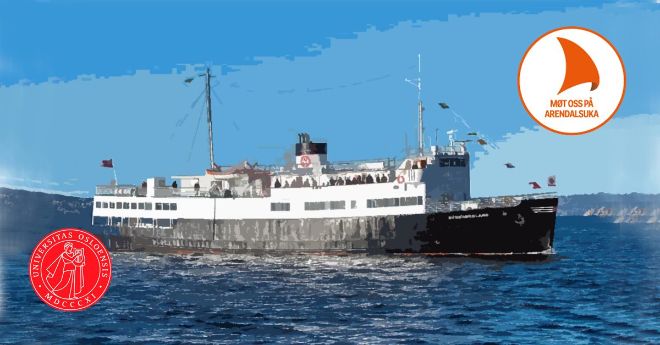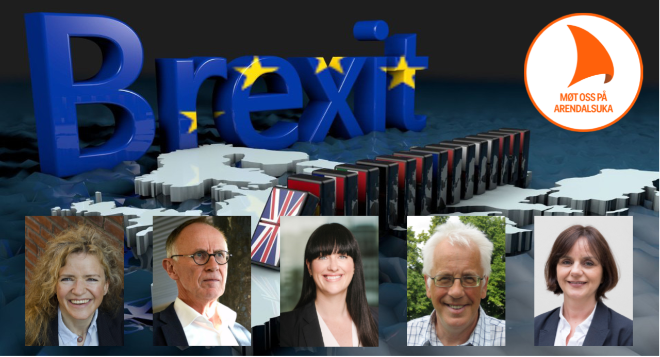What can we learn from Brexit? What can we expect from the newly elected European Parliament and the new leaders of the Commission, and what does it mean for Norway? These were some of the main questions ARENA asked at Arendalsuka.

'Knowledge straight from the source' was the University of Oslo's slogan during Arendalsuka 2019. Image: UiO
Arendalsuka is a Norwegian political festival which takes place in Arendal every summer. This year, the programme consisted of more than 1200 events and 200 stands. The University of Oslo participated with 25 events on board the veteran ship MS Sunnhordland, on topics ranging from climate and urban planning to loneliness and dental health.
Almost 150 people came to ARENAs events, which focused on two highly current EU-related topics: Brexit and the new EU Parliament and Commission. Among the panelists' conclusions was the great need for more research on the dynamics and consequences of European integration.
Brexit: What can we learn?
ARENAs first event was a discussion on the background for Brexit and what consequences the UKs withdrawal will have for stakeholders in the Norwegian business and research sectors.
Erik Oddvar Eriksen, Professor and Director at ARENA, opened the conversation by saying that Brexit in many ways is a result of a lack of knowledge. In particular, he argued that the British media and politicians has not done a sufficient job on communicating these highly complex issues to the public. Stein Reegård, Senior Adviser and former Chief Economist in the Norwegian Confederation of Trade Unions (LO), agreed. He said that people in the UK were not aware of how integrated they actually were, nor did they have a clear idea of what they wanted to achieve when they voted for Brexit in 2016. This resulted in a referendum that was more about identity than about actual consequences and British interests.
The UK is one of Norway's biggest trading partners, and Brexit can have a great effect on Norwegian businesses. According to Benedicte Staalesen Nilsen, Senior Adviser in the Confederation of Norwegian Enterprise (NHO), this is not just a question of increasing tariffs, but also several other challenges that arise from a lack of common rules and regulations. For example, we cannot afford that fresh fish from Norway has to go through lengthy veterinary checks at the border because Norway and the UK no longer have common veterinary regulations. She emphasised, however, that the Norwegian government has negotiated transitional arrangements and that NHO is working hard to prepare Norwegian businesses in case of a no-deal Brexit.
Preparations can also be made in the research sector. Kristin Danielsen, Executive Director of the Norwegian Research Council, made it clear that Norway will continue to cooperate closely with the UK in this area. She also said that the EEA Agreement has been highly positive for Norway as it has led to a good and productive cooperation with the European Commission in the field of research funding. In contrast, countries like Switzerland, who do not have a similar framework, have much less influence.
However, according to Staalesen Nilsen, Norway and the EEA Agreement can be negatively affected by the ongoing Brexit negotiations because it has become important for the EU to clearly mark the difference between being inside the Union as a member state and outside as a third country.
Eriksen also pointed out that even though there seems to be a consensus in Norway that the EEA Agreement is necessary, it is also important to look at the Agreement's challenges and lack of democratic legitimacy.
All the panel participants agreed that Brexit would have wideranging consequences and that the difficult process of actually leaving the Union is a reminder of how integrated Europe has become.
Moderator: Åse Gornitzka, Vice-rector and Professor, University of Oslo
Watch the full debate here (in Norwegian):
The aftermath of the European elections
Both the European Parliament and the European Commission will be replaced in 2019, and ARENAs second event revolved around the 2019 European elections and the new Commission leaders. What were the results of the elections and what can we expect from the new Parliament?
ARENA Professor Chris Lord kicked off the event by giving an introduction to the election results and pointed out that voter turnout grew for the first time since 1979. In addition, the seats in the European Parliament became more distributed across party groups. This means that the two main party groups, the centre-left and the centre-right, lost their majority in the Parliament for the first time. Almost all the other groups, most notably the Liberals and the Greens, increased their seats. This might create more room for politics and contestation in the Parliament than before, and can be interpreted as a sign that the EU is moving in a more democratic direction.
Lord also pointed out that the 2019 elections saw more people voting on European issues, rather than just voting based on national politics. He underlined that in addition to the traditional right-left-cleavage in politics, a new cleavage between more or less European integration has emerged, and these two will have to co-exist in the years to come.
Espen Barth Eide, member of the Norwegian Parliament and former Minister of Foreign Affairs (Labour Party), agreed with Lord's analysis and added that although the far right increased their number of seats, they will have limited political influence. In the debate about the new Commission president, the Conservative Ursula van der Leyen, she had to lean to the left on both social and climate policies in order to achieve the necessary support in the Parliament. She now supports a quite progressive agenda on climate, including a 55 per cent emissions cut by 2030, a carbon tax and a significant increase in green investments.
Member of the Norwegian Parliament (Conservative Party) and leader of the European Movement in Norway Heidi Nordby Lunde agreed with Barth Eide that the new Commission leader's agenda seems very constructive, and also fits well with what we might call 'Nordic values'. This is positive from a Norwegian standpoint. She also underlined the importance of the EU in the current global context, where a stable and prosperous Europe is necessary to counter-act developments like the US-China trade war and increasing Russian interference.
This view was echoed by Sten Inge Jørgensen, author and journalist in Morgenbladet. He said that the current global situation, with the US, China and Russia all moving in a more authoritarian direction, is quite unique historically. He emphasised the importance of both finding inner unity in the EU and increasing its ability to defend itself from external threats. He also said that despite the several crises that have affected the EU over the last decade, its popularity is now higher than in 35 years, and there seem to be a will to continue the work for a stable and well-functioning Union.
Moderator: Erik O. Eriksen, Director and Professor at ARENA
Watch the full debate here:








